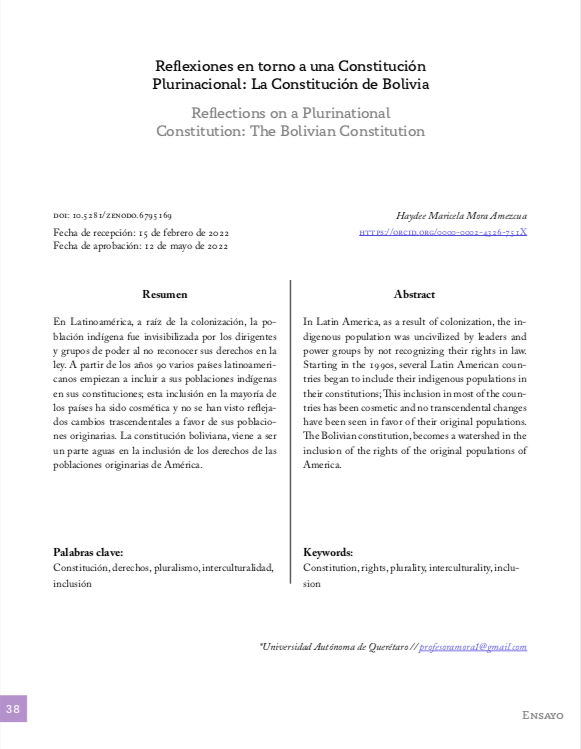
Keywords
rights
plurality
interculturality
inclusion
Abstract
In Latin America, as a result of colonization, the indigenous population was uncivilized by leaders and power groups by not recognizing their rights in law. Starting in the 1990s, several Latin American countries began to include their indigenous populations in their constitutions; This inclusion in most of the countries has been cosmetic and no transcendental changes have been seen in favor of their original populations. The Bolivian constitution, becomes a watershed in the inclusion of the rights of the original populations of America.

This work is licensed under a Creative Commons Attribution-NonCommercial-ShareAlike 4.0 International License.
Copyright (c) 2022 ALBORES
Similar Articles
- Mario Armando Vázquez Soriano, Editorial , Albores: Vol. 3 No. 5 (2024): Albores. Revista de Ciencias Políticas y Sociales
- Iván Patricio Ríos Sangucho, Discourses of inclusion, difference and normalization: The concept of inclusion in the construction of people with disabilities , Albores: Vol. 3 No. 5 (2024): Albores. Revista de Ciencias Políticas y Sociales
- Gerardo Cantú Sanders, Thinking of social rights as the center of human rights , Albores: Vol. 2 No. 3 (2023): Albores. Revista de Ciencias Políticas y Sociales
- María del Pilar Hernández Limonchi, Approach to indigenous youth problems in the Totonacapan of Puebla , Albores: Vol. 2 No. 2 (2023): Albores. Revista de Ciencias Políticas y Sociales
- José Antonio Carrera Barroso, Pedro Rafael Constantino Echeverría, Political transnationalism and the struggle for representation: #RedVotoChilango, a transnational network , Albores: Vol. 2 No. 2 (2023): Albores. Revista de Ciencias Políticas y Sociales
- Lourdes Leticia Machado Balbuena, Williams Chavero Jiménez, Juan Pedro Horta Sánchez, Mariana Itzel Nava Rodríguez, Impact of information and communication technology (ICT) on the child and adolescent population during the COVID-19 pandemic: Analysis from a bioethical perspective , Albores: Vol. 3 No. 4 (2024): Albores. Revista de Ciencias Políticas y Sociales
- Gabriel de Jesús Gorjón Gómez, Moisés David López Pérez, Telework and its possible regulation in Nicaragua's labor , Albores: Vol. 3 No. 5 (2024): Albores. Revista de Ciencias Políticas y Sociales
You may also start an advanced similarity search for this article.
Most read articles by the same author(s)
- Alfonso Andres Cortez Lara, Ivan Alejandro Martínez Zazueta, Drought, brewing megaproject and the citizen water agenda in Baja California , Albores: Vol. 3 No. 5 (2024): Albores. Revista de Ciencias Políticas y Sociales
- María Teresa Valdés Hernández, Self-employment as a way of personal empowerment: the case of the uaq University Market producers , Albores: Vol. 2 No. 2 (2023): Albores. Revista de Ciencias Políticas y Sociales
- Genaro García Guzmán, Karen Paulina Muñoz Arellano, Water, city and neo-extractivism: introductory exercises on de-blackboxing the hydrosocial cycle , Albores: Vol. 2 No. 2 (2023): Albores. Revista de Ciencias Políticas y Sociales
- Michele Nicole Delgado Calderón, Stereotyping of women in the electoral campaign of Jeanine Añez , Albores: Vol. 2 No. 3 (2023): Albores. Revista de Ciencias Políticas y Sociales
- Ricardo Ordaz Vega, An interpretation of poverty in the Encyclical Letter Fratelli Tutti , Albores: Vol. 3 No. 4 (2024): Albores. Revista de Ciencias Políticas y Sociales
- Daniel Rojas Navarrete, The Political Craft: The Ruling Elite in Mexico (1946-2020) , Albores: Vol. 2 No. 2 (2023): Albores. Revista de Ciencias Políticas y Sociales
- Miguel Moreno Plata, The challenges of environmental governance in the face of the risk and uncertainty associated with climate change , Albores: Vol. 1 No. 1 (2022): Albores. Revista de Ciencias Políticas y Sociales
- Carla Angelini, On the dictatorship of happiness. A manifesto , Albores: Vol. 2 No. 2 (2023): Albores. Revista de Ciencias Políticas y Sociales
- Malinka Enya Aceves Martínez, Cultural Synchrony: K-pop, a Lifestyle for Young Queretaro Residents , Albores: Vol. 3 No. 4 (2024): Albores. Revista de Ciencias Políticas y Sociales
- José Antonio Carrera Barroso, Pedro Rafael Constantino Echeverría, Political transnationalism and the struggle for representation: #RedVotoChilango, a transnational network , Albores: Vol. 2 No. 2 (2023): Albores. Revista de Ciencias Políticas y Sociales

